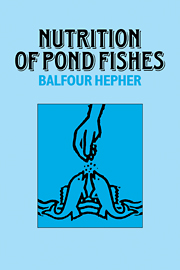Book contents
- Frontmatter
- Contents
- List of symbols
- Preface
- Introduction
- Part I FOOD REQUIREMENT
- 1 The balance of energy
- 2 Ingestion, digestion and absorption of food
- 3 Energy pathways
- 4 Maintenance
- 5 Growth
- 6 Requirement for protein
- 7 Other essential nutrients
- Part II FOOD SOURCES AND THEIR UTILIZATION
- Appendixes
- References
- Systematic index
- Subject index
- Frontmatter
- Contents
- List of symbols
- Preface
- Introduction
- Part I FOOD REQUIREMENT
- 1 The balance of energy
- 2 Ingestion, digestion and absorption of food
- 3 Energy pathways
- 4 Maintenance
- 5 Growth
- 6 Requirement for protein
- 7 Other essential nutrients
- Part II FOOD SOURCES AND THEIR UTILIZATION
- Appendixes
- References
- Systematic index
- Subject index
Summary
For maintaining the normal processes of life such as respiration, blood circulation, excretion, osmoregulation, digestion and movement, the fish requires energy. These processes and the energy required to maintain them are referred to as ‘maintenance metabolism’ (QM). Those processes most vital for immediate survival, such as respiration and blood circulation etc., constitute the ‘basal metabolism’ (QB). The other processes are vital for a longer duration existence. It should be remembered that maintenance requires not only an energy input, but also a material build-up by biosynthesis. This is required in part to replace worn-out tissues and cells, such as epithelial cells; in part to supply enzymes and hormones which may be ‘recycled’ rather quickly; and in part to supply continuous secretions such as mucus. From a quantitative point of view these material requirements may be expressed as energy values, but they also have qualitative aspects which must be taken into account when considering the fish diet. These aspects will be discussed later in the book.
When fish are starved and thus do not receive the energy required for maintenance, they utilize their own body tissues for this purpose. Fat depots, if they are present, will be utilized first, but tissue proteins are also utilized. Thus, during fasting fish lose weight. When they are fed they utilize the food first for supplying the necessary energy for vital maintenance processes and replacing tissue catabolism, and only then can the surplus be used for growth.
- Type
- Chapter
- Information
- Nutrition of Pond Fishes , pp. 104 - 146Publisher: Cambridge University PressPrint publication year: 1988



